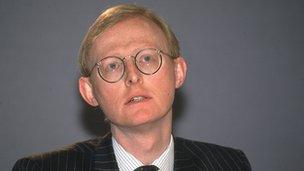Police pay to start £4,000 lower, at £19,000
- Published
- comments
Ex police minister Nick Herbert said it meant new officers would be paid for their skills, rather than their length of service
The starting salary for police constables in England and Wales is being cut by £4,000 to £19,000, the home secretary has confirmed.
Theresa May has accepted recommendations on reform made by the Police Arbitration Tribunal.
It follows proposals put forward last year in a review for an overhaul of police pay, conditions and allowances.
The Police Federation said it was "disappointed" by the announcement.
The Scottish Ministry of Justice tweeted:, external "Home Office cuts to police starting salaries will not be imposed in Scotland."
Ex-rail regulator Tom Winsor, the review's author, was appointed last year as the Chief Inspector of Constabulary for England and Wales, the first non-policeman named to the post.
He recommended £1bn could be cut from police pay.
Mrs May has deferred plans to allow forces to make officers redundant to allow for further negotiation.
A special bonus - known as a competence-related threshold payment (CRTP) - will also be phased out over the next three years.
The CRTP - which is worth £1,200 a year - was first mooted for scrapping by the Winsor report in 2011.
The BBC's home affairs correspondent Tom Symonds said the starting salary would be £19,000 for recruits with no policing experience but £22,000 for more experienced officers, such as those who had worked as special constables or PCSOs.
He said the proposals also cut the number of pay scales from 10 to 7, meaning officers could reach the higher pay grade of £36,000 more quickly.
Under the PAT proposals police in London get extra payments of £6,615 a year and those in the south-east of England up to £2,000 because of higher living costs.
Mrs May said: "These reforms build on the changes we implemented [in January last year].
'Modernise pay'
"They continue our programme to modernise... pay and conditions so that they are fair to both officers and the taxpayer. They include measures to re-target pay to reward contribution, increase local flexibility and make important structural changes to enable further reform."
Labour's shadow policing minister, David Hanson, said: "There is a real worry that the proposed starting salary for all police officers will damage the ability of police forces to recruit officers of the right skills and experience and directly contradicts the government's own wish to limit recruitment to those with three A-levels and recruit professional people from outside the police."
The chairman of the Police Federation in England and Wales, Steve Williams, said: "Whilst we remain disappointed with some of the PAT's recommendations we acknowledge that the home secretary has honoured the process of the Police Negotiating Board.
"We will continue to engage fully on behalf of our members."
But Keith Vaz MP, chairman of the Home Affairs Select Committee, said morale in the police force was at "an all-time low" and added: "This is the wrong time to cut the pay of ordinary police officers."
Chief Constable Peter Fahy: "I personally think it will be pretty rare in the future for someone to be appointed at £19,000"
The Association of Chief Police Officers' (Acpo) lead on workforce development, chief constable Peter Fahy, said: "In a service where over 80% of budget is spent on people, it is more vital than ever that we have terms and conditions for all staff that both reward them for what they do and represent value for money.
"Officers can also reach the top rate of pay three years earlier than under the current arrangements."
At the weekend the BBC reported how the number of young police officers in England and Wales had fallen by nearly 50% in two years.
Overall police numbers hit a nine-year low in 2012, due to tighter budget constraints slowing recruitment.
Currently sworn police officers are servants of the Crown, not employees, so they cannot be made redundant.

The salary changes were originally recommended by former rail regulator Tom Winsor
But some forces have been using a regulation known as A19 to make officers with 30 years experience or more retire early.
The Winsor Report recommended allowing forces to make any police officer redundant, not just those with 30 years experience.
Scotland's Justice Secretary Kenny MacAskill said the Scottish government did not commission the Winsor review and he said: "We will not impose changes to the terms and conditions of our hard-working, dedicated officers.
"Starting salaries for our police constables in Scotland will stay the same.
"The police service in Scotland will not be privatised, we will safeguard officer numbers, we will not implement the Winsor package north of the border."
A spokeswoman for Northern Ireland's Department of Justice said: "The announcement by the Home Secretary regarding pay scales will relate to new recruits in England and Wales.
"The minister, the Policing Board and the PSNI routinely consider developments elsewhere in the UK and their potential implications in the context of Northern Ireland. Any proposals relating to pay are negotiated at Police Negotiating Board in the usual way."
- Published6 December 2012
- Published29 March 2011
- Published13 January 2013
- Published14 January 2013
- Published30 January 2012
- Published30 January 2012